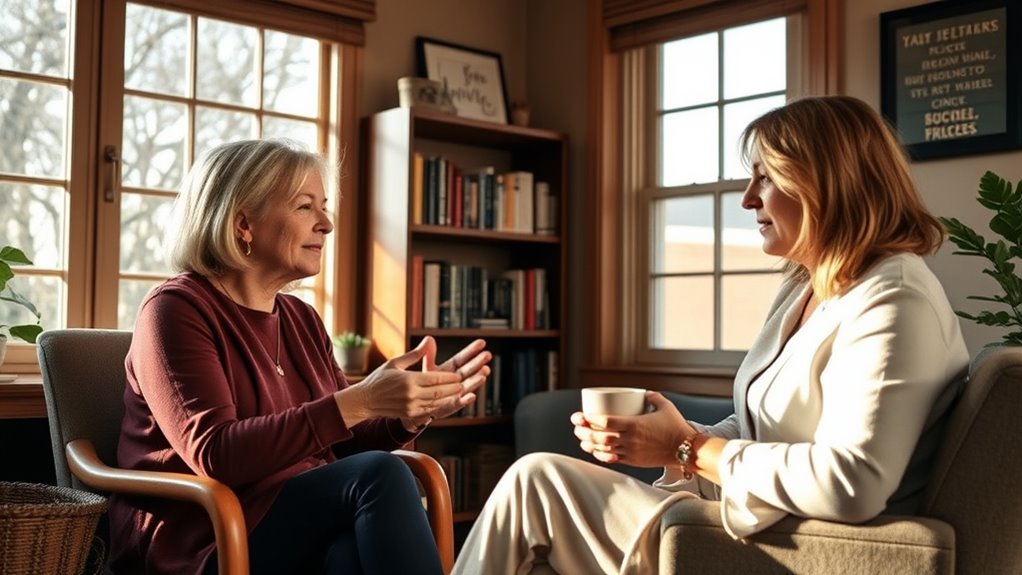A divorce coach guides you through one of life’s toughest shifts by offering clear strategies tailored to your situation. They help you manage emotions, set realistic goals, and stay focused on your long-term well-being. With support, you’ll gain confidence, reduce stress, and make informed decisions without feeling overwhelmed. Combining emotional encouragement with practical advice, a coach empowers you to rebuild your life with hope and purpose—discover how they can make a difference for you.
Key Takeaways
- Provides tailored coaching strategies to navigate the divorce process confidently and clearly.
- Offers emotional support, helping manage feelings like anger, sadness, and fear.
- Assists in breaking down overwhelming tasks into manageable steps for effective progress.
- Encourages focus on long-term goals, personal growth, and resilience amid emotional upheaval.
- Acts as a supportive confidant, combining practical guidance with emotional encouragement for renewal.

Are you feeling overwhelmed by the prospect of divorce and unsure where to turn for support? You’re not alone. Going through a divorce can feel like an emotional rollercoaster, leaving you uncertain about the next steps. This is where a divorce coach can make a real difference. They’re trained to provide coaching strategies that help you navigate this challenging time with clarity and confidence. A divorce coach isn’t here to make decisions for you but to guide you through the process, helping you stay focused on your goals and priorities. They understand that emotional support is vital during this time, and they’re skilled at offering a safe space where you can express your feelings without judgment.
One of the key ways a divorce coach helps is by providing coaching strategies tailored to your unique situation. These strategies are designed to help you manage stress, set realistic goals, and develop actionable plans for your future. Whether you’re trying to handle legal complexities or emotional turmoil, your coach can help you break down overwhelming tasks into manageable steps. They’ll encourage you to focus on what you can control, helping you build resilience and confidence. This structured approach can alleviate feelings of chaos, giving you a sense of direction when everything else feels uncertain. Incorporating emotional support is essential, as it fosters resilience and helps you process difficult feelings more effectively. Additionally, your coach can guide you in understanding divorce statistics and how they might relate to your situation, providing perspective and reassurance. Recognizing that emotional health impacts decision-making can motivate you to prioritize self-care during this time. Knowing about coping mechanisms can equip you with practical tools to handle emotional upheaval more effectively.
Emotional support from a divorce coach makes a significant difference. Divorce can stir up intense feelings like anger, sadness, guilt, or fear, which can be difficult to process alone. Your coach provides a compassionate ear and practical guidance, helping you understand and manage these emotions instead of letting them overwhelm you. They can teach you coping techniques that foster emotional stability and help you build a positive outlook for your future. This support isn’t just about comfort; it’s about empowering you to face each day with strength and renewed hope.
Furthermore, a divorce coach helps you maintain perspective. As emotions run high, it’s easy to get caught up in negative thoughts or impulsive decisions. Your coach can serve as a steadying presence, reminding you to stay focused on your long-term well-being. They help you see the bigger picture, encouraging self-care and personal growth even amid turmoil. This positive reinforcement and emotional support can motivate you to keep moving forward, making the process of divorce less intimidating and more manageable.
In essence, a divorce coach combines coaching strategies and emotional support to guide you through one of life’s toughest transitions. They’re your advocate, cheerleader, and confidant, helping you rebuild your life with hope and purpose.
Frequently Asked Questions
How Do I Find a Qualified Divorce Coach?
To find a qualified divorce coach, start by researching professionals with credentials like ICF certification. Look for someone experienced in boosting emotional resilience and guiding financial planning, which are key during divorce. Read reviews, ask for referrals, and schedule consultations to guarantee their approach aligns with your needs. Trust your instincts to choose someone who makes you feel supported and motivated to navigate this challenging progression confidently.
What Costs Are Associated With Hiring a Divorce Coach?
When considering the costs of hiring a divorce coach, you should expect to pay per session or a package rate, which varies widely. These costs often include financial planning guidance and emotional support, both essential during divorce. Keep in mind that investing in a coach can help you navigate complex decisions more confidently. Some coaches offer sliding scale fees or packages, so it’s worth discussing options to fit your budget.
How Long Does the Coaching Process Typically Last?
The coaching process usually lasts several months, but it varies based on your needs and goals. During this time, you’ll build emotional resilience and develop decision-making strategies that empower you. You’ll work closely with your coach to navigate challenges, set milestones, and stay motivated. This tailored approach guarantees you get the support you need at your own pace, helping you move forward confidently and purposefully through your divorce journey.
Can a Divorce Coach Assist With Child Custody Issues?
A divorce coach can definitely assist with child custody issues. They help you develop effective co-parenting strategies, ensuring you prioritize your child’s well-being. They also guide you through negotiations related to child support, making sure your concerns are addressed. With their support, you gain clarity and confidence to navigate custody arrangements, reducing stress and fostering healthier relationships with your children during this challenging time.
Is Coaching Effective Alongside Therapy or Legal Counsel?
Think of it as having your cake and eating it too—you can absolutely benefit from coaching alongside therapy or legal counsel. A divorce coach offers emotional support and helps with decision making, complementing professional advice. This teamwork guarantees you’re well-rounded, covering your emotional, mental, and legal needs. Together, these resources create a safety net, guiding you smoothly through the stormy waters of divorce.
Conclusion
A divorce coach can truly guide you through the chaos, helping you find clarity and strength. But as you begin this journey, remember—there’s more waiting on the other side than you might expect. With each step forward, you’ll uncover new resilience and possibilities you never imagined. Are you ready to take that next step and see what your future holds? The path may be uncertain, but with the right support, you’re about to discover a whole new chapter.










